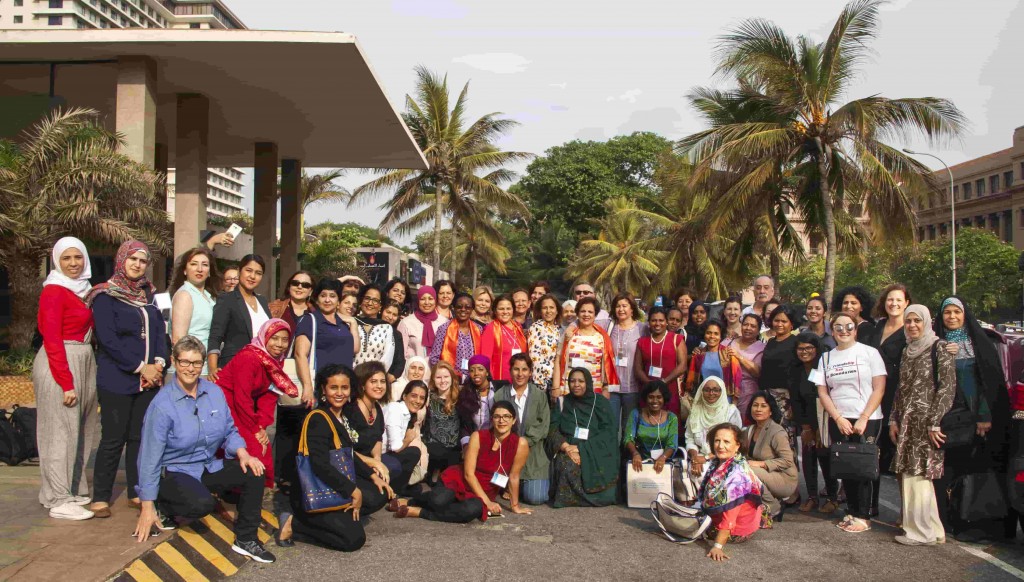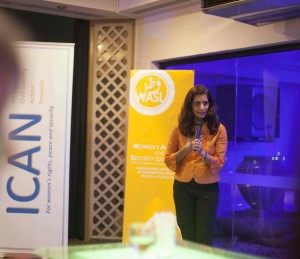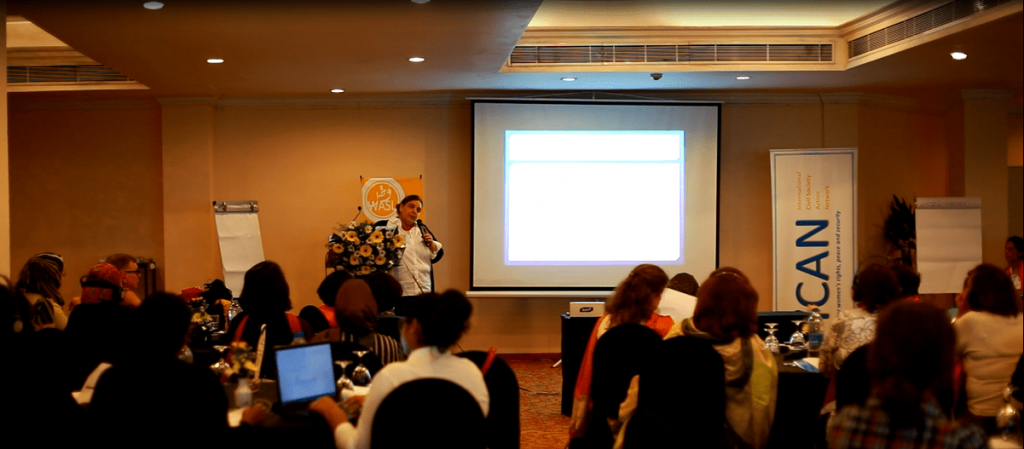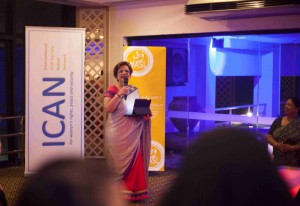Aya Nader writes from ICAN’s Fifth Annual Forum highlighting the work of extraordinary women fighting for peace, pluralism and preventing violent extremism

ICAN’s Fifth Annual Forum held in Sri Lanka in November 2016
“Despite all global and national efforts to combat terrorism, terrorism is more frequent than ever. With all due respect to resolutions… most important is grass-root organizations and civil society,” said Alexander Zuev, UNDP’s Global Programme Manager and Special Advisor on Prevention of Violent Extremism, speaking to more than 70 women who come from different parts of the world, yet violent extremism has taken a toll on all their homelands, one way or another.
Academics, educators, and advocates risking their lives to bring about peace and change to a restless world came together at the International Civil Society Action Network (ICAN)’s 5th annual forum in Sri Lanka. For three days, the women discussed tactics and shared experiences on preventing extremism, namely through promoting rights, peace, and pluralism.
In many countries, peace and security are undermined in the name of culture, and women’s rights are contested as being culturally “other” and “Western”, said ICAN Co-Founder and MENA/Asia Program Director Sussan Tahmasebi. ICAN’s work sends the message that peace and security are indigenous in MENA, Asia, and Africa. They are not Western, but rather the demands of these regions’ women, she explained.
Founded in 2006, ICAN uses four strategies to achieve its mission: providing a safe space; making resources, support, and technical assistance available; producing information and analysis; and widening and creating new access and influence.
The network ensures women are involved in peace processes, such as in Syria, or at international conferences where important issues, such as violent extremism, are being addressed.
“It’s never about going in and fitting into someone else’s agenda, it’s about going in and shaking the agenda,” asserted ICAN Co-Founder and Executive Director Sanam Naraghi-Anderlini.
Combating Extremism from the Battle Ground
The manipulation of religions, online recruitment, and promises of either money or a heavenly afterlife feed the whirlpool of

Women shared their knowledge during the ICAN Forum 2016
extremism. Mothers’ blessings, dire economic conditions, governments which play the same hand, and inciting religious leaders push the numbers higher. Women activists push back and change the narrative.
In Iraq, Fatima walked into an anti-ISIS military camp, frantically searching for her 15 year old son. Although unable to find him at first, several camps later, she brought her son home. And with him, she was able to convince 150 boys to give up arms and go back to school.
Throughout her search mission, Fatima gathered information about the young boys’ lives in camps, and why they joined. She formulated a counter-argument from within religion, refuting the calls “kill the enemy or die a martyr.” Furthermore, she teaches the youth how to convince their peers not to go to battle. Her work saves thousands of young boys and men.
More than four thousand kilometres away, Tunisian Professor Amel Grami has devoted a weekly paper to analyze extremist issues and provide different perspectives. She involves her students and discusses other religions, building bridges through sociology or anthropology of religions.
In Sudan, women’s rights activist Adla Abubaker was in the middle of another ideological battle. As in many other countries, women are regarded as inferior to men, existing to serve them. In May of this year, Abubaker held a strategic meeting where men discussed women’s issues, produced a manual, and designed the project ‘Men as Allies’ to push for gender issues. She also contributed to the journal ‘Women and Islam’ where scholars address the key issues and dissemination of rights.
Fighting the same battle on the other side of the world, Zeboniso Sharifova spoke of how girls who have marriage problems in Tajikistan are manipulated by promises of better conditions in the next life, and how the notion that women were created from the rib of Adam is used to justify women’s inferiority. Sharifova created a manual for religious leaders on women’s rights, and worked with 100 Sheiks and Imams to spread the message.
On the conference’s agenda was an issue rarely tapped: the stigma attached to the families of fighters, who are forced into isolation from society. In Tunisia, for example, these families are stigmatized to the extent that vendors refuse to sell them bread. Activists refuse to work with them.
Reintegrating them into society is a must, the women agreed. There should be public and social awareness that families should not have to suffer the consequences of certain members’ decisions. One method is to use religious texts that state that no person carries another’s sins. Governments’ lobbying to allow civil society to work with such families and creating support groups were also suggested.
In Kenya, Sureya Ali Roble, the National Vice Chairperson of the Maendeleoyawanawake Women’s Movement, encourages women to speak up so that others learn from them, connecting mothers of fighters to help each other. Instead of living alone in fear, they now have a voice together.
Civic Education for Peace

Sanam Naraghi speaking during session in ICAN Forum 2016
The official or dominant religion in a developing country monopolizes its educational system. With conflict in Iraq, Syria, Pakistan and other places, curricula are changing to become even more radicalized. In some cases extremist teachers remove the “minority” children from the classrooms. A great part of the forum was dedicated to strategies that could vaccinate against extremism from a younger age.
In the words of Mossarat Qadeem, education in Pakistan is all about Jihad and “preparing children to fight.” Mossarat and her sister Bushra, both educationists, took matters into their own hands. Mossarat introduced a new model of peace education, now expanded to five schools and madrassas (religious schools) after its success in her own school and college in Peshawar. To negate violent ideas, students are taught core values that were lost in the mayhem. They are infused with honesty, humbleness, generosity, kindness and forgiveness through various activities such as theatre, creative writing, and sports.
“They learn lessons from history regarding acceptance, an aspect of history completely ignored by textbooks,” Bushra emphasized.
Most importantly, there is a training manual for teachers and parents.
“Peace education should be part of mainstream education,” Bushra holds.
Agreeing, Lebanon’s human rights advocate Nuhad Sheikh said, “It all starts from civil rights. ‘Everyone has the right to life’ could be a start, countering killing and this kind of extremism.” If we include what other religions and philosophies have said about a topic, it would be inclusive and would create pluralism, she continued.
In the Philippines, President of the Philippine Center for Islam and Democracy and member of the Board of Regents of the Mindanao State University Amina Rasul has made it a point to share progressive ideas with conservatives. Among her publications is the Islamic Model for Peace Education, used by Muslims teaching good governance and civil society, and the Alemat Module, used by the Commission for Human Rights and women teaching in madrassas. They also use stories from religious texts, folkloric stories, and history to show human rights are not merely “Western.”
Shadia Marhaban, who was part of a peace negotiating team in Helsinki (2005) that ended the 30 years conflict in Indonesia, organizes exposure visits to temples at least twice a year. Expanding learning beyond the prevailing Islamic religion is part of the ‘Interfaith’ program she is involved in.
As young as six, children in Bahrain were introduced to storybooks about differences, when Wajeeha Al-Baharna, the founder of Women Association for Human Development, weaved values of being different human beings into their little universe.
Summing up, Anderlini maintained that educators should “use what it means to be a human being and break it down, situating it in culture, religion and other contexts… Discrimination is learned behavior.”
Sexual and Gender Based Violence
Women are subjected to exceedingly high rates of verbal, emotional and physical abuse in developing nations. Rape culture is widespread, survivors are blamed, honor killings are a norm, and militaries have their share of crimes.
In Sudan, widespread sexual violence, including rape and gang rape by soldiers in uniform and men in plain clothes is committed, according to the UN. Adla Abubaker, Program Coordinator at the Strategic Initiative for Women in The Horn of Africa, presents how the initiative arranges literacy classes, works with community leaders, helps survivors deal with trauma, and provides psycho-social support to families of survivors. They have established a network of doctors, lawyers, social workers, and psychiatrists, all made available for survivors.
Even upon filing a lawsuit, legal cases in some countries either need difficult evidence, or take an extremely long time to be ruled about. In Sri Lanka, a girl may be raped at 12, but by the time the case arrives to court, she is 20 and married. In addition, customary laws are discriminatory against women; for instance a woman may be forced to marry her rapist.

Sussan Tahmasebi speaking during session in ICAN Forum 2016
Moreover, the stigma makes it harder for women to talk about sexual violence, or report it. Women might be killed, sometimes stoned to death, if they are raped. Survivors therefore might commit suicide.
Palestinian Lucy Talgieh, Program and Advocacy Coordinator at Wi’am Palestinian Transformation Center, runs an anti-violence campaign in Bethlehem. As much as 37 percent of Palestinian women suffer violence by husbands, according to the Palestinian Central Bureau of Statistics, which pushed Talgieh to join forces with governmental Mehwar Center, where they provide shelter and rehabilitation for women that have suffered domestic abuse and rape.
UNDP’s Zuev pointed out that family violence tends to be mostly gender based. For this reason, Indonesia’s Shadia Marhaban introduced mediation inside the family. If, for example, a wife and husband do not want to go to the police, a woman mediator would help out with issues. Meanwhile, local media often acts as an obstacle to women’s rights initiatives. “If a woman is raped at one am, the [media] message would be ‘Why would women go home late at night alone?’” said Turkish Professor Ayşe Betül Çelik.
At best, media would portray survivors as victims. Marhaban instructed journalists on how to change the language, and gave them legal training as well. She also trained women in the police force, and educated them about trauma. “Previously, they were nasty to survivors,” she recalled.
In many societies, publicly talking about these issues is still a taboo. One such place would be Iran. To get around this, women’s rights activist Raheleh Askarizadeh spoke about sexual violence through a case from Afghanistan. “We talked about everything we wanted,” she stated. “We also had a street performance, where makeup showed swollen eyes and bloodied people. The moment someone would pay attention, they would hand them cards with stories of survivors, all happening in a blink of an eye to avoid getting arrested.”
Similarly creative, Mariyam Shakeela, Chairperson to the Maldives Network to Empower Women, narrates how in the Maldives, activists launched a song with a message on the International Day Against Violence. A group of mostly women rode around the Islands with loudspeakers playing the song. Soon after, women came forward to tell their stories and sought physiological help.
Economic Policy and Extremism
Participants at the forum discussed how extreme capitalism drives conflicts. The security sector is booming, and extremism cannot be prevented by focusing on just the security issue, economics plays a huge part of it. State interests also have a role, one screaming example being how the privatization of prisons in the USA encourages the increase of prisoners.
In addition, services come with ideology; it seeps in through religious institutions, like the Catholic Church in Latin America and madrassas in Pakistan. In Egypt, the Muslim brotherhood hands out economic “gifts” to help in recruitment and gaining ideological support, while the government also uses the same tactic to gain mass support.
“When the state steps out, it is often religious groups or organizations that step in to provide social services, often done for the right reasons and sometimes done well, but often also the services come with ideology,” explained Melinda Holmes, project coordinator and advisor to the Women’s Alliance for Security Leadership (WASL), spearheaded by ICAN. “For example, health services will not include birth control or recipients of aid feel pressure to also attend or listen to preachers or accept bibles or attend religious events,” she stated.

Senator Mobina Jaffer speaking at the ICAN Forum 2016
These issues need to be looked at with a nexus between gender and extremism, understanding the economic discrimination is the most important aspect.
“What we have today is the [women’s] selfless, tireless work,” said Canadian Senator Mobina Jaffer, who heads ICAN’s board, thanking them for having the courage to work in their countries in such difficult times
ICAN’s first forum included 14 countries. Today, it partners with 27. The women left with stories from all around the world, shared pain and laughter, and most importantly, a push to keep going, to keep doing what politicians cannot, to execute more on the ground work where people are invisible to those above.
“So long as we are not in government, we need to think how to creatively make use of spaces we can occupy,” concluded ICAN’s Sanam Naraghi-Anderlini.
